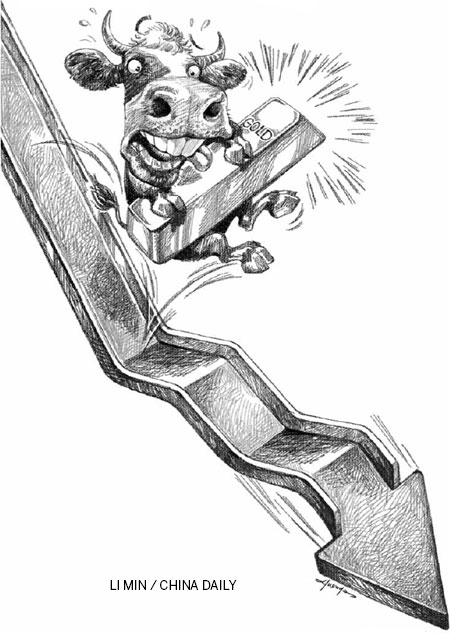Is this the end of a golden age?
Updated: 2013-04-23 08:12
By Julian Jessop (China Daily)
|
|||||||||||

After a decade-long bull market, investors appear to have fallen out of love with gold. The dramatic collapse in prices that began on April 12 has certainly undermined confidence in the precious metal and left many wondering whether it could ever be regarded as a safe haven again. In fact, sentiment has been weakening for some time, reflected in the large outflows from gold exchange-traded funds and fading enthusiasm for gold among speculators in the US futures market.
Nonetheless, the trigger for the recent slump appears to have been aggressive selling by a handful of traders, rather than the reversal of the fundamental drivers that have lifted gold prices in the past and may well do so again. Indeed, none of the fundamental explanations being discussed for the slump in gold prices really makes sense. One is the possibility that the troubled eurozone countries will be forced to sell their official reserves of the precious metal.
However, it is not even certain that Cyprus, whose holdings are tiny anyway, will actually sell any gold. What's more, if the crisis in the eurozone does escalate to the point where other, larger countries were desperate enough to consider dipping into their own reserves, demand for safe havens would surely be so strong that there would be plenty of willing buyers for this gold - even at higher prices.
Another fundamental explanation for the recent slump in gold prices is the possibility that the US Federal Reserve might scale back its asset purchases under quantitative easing (QE3) later in the year. Rising (real) yields could also reduce the attractiveness of an asset, like gold, which pays no income.
But, if anything, the weakness of the latest US economic data has made it less likely for the Fed to withdraw its monetary stimulus any time soon. Indeed, global bond yields have actually been falling in recent weeks, in part because of the prospect of additional monetary easing from Bank of Japan, the country's central bank.
Alternatively, market sentiment may simply have been turned by the bearish note issued by a well-known US investment bank recently. But while their timing has been impeccable, the bears do not appear to have made any new arguments. Their emphasis on the risks to the price of gold posed by a stronger global economic recovery and by rising interest rates certainly looks increasingly misplaced, or at least premature.
Admittedly, it would be wrong to ignore the major shift in sentiment toward gold in 2012, at least among Western investors. Gold appeared to have moved from being regarded primarily as a safe haven and inflation hedge to being treated as just another risky asset. Since gold had already doubled in price since 2008 - and provides no income - it is understandable that it might look less attractive to many investors, especially when equities have been doing so well.
But there are still some important supports. One is continued healthy demand from emerging economies, both from central banks and from households in countries such as India, as well as China. Another is the prospect of an extended period of very low interest rates in the US, Europe and Japan.
Looking ahead, a number of factors could still lift gold to new highs. The true test of a safe haven comes in bad, not good, times. Here the key point is that the financial crisis in the eurozone is far from over. It also seems premature to dismiss gold's appeal as a hedge against inflation. Thus far, inflation and inflation fears have remained low in the West, despite the massive monetary expansion already in place (or in the pipeline).
But central banks will have to time the withdrawal of this stimulus carefully. Too late and inflation could take off. Too soon and the resulting increase in market volatility from current low levels could simply shift demand toward gold as a safe haven, more than offsetting any drag from higher interest rates.
These are of course factors that individual investors will have to weigh up for themselves. But the appeal of an asset whose value is independent of the creditworthiness of any government or financial institution, and which cannot be created by central banks, may yet prove irresistible again.
We therefore do not expect the current weakness in the gold price to be sustained, provided the risk of an escalation of the eurozone crisis remains high and the global recovery is still fragile, thus keeping monetary conditions exceptionally loose.
The author is head of commodities research at Capital Economics, a leading global macroeconomics research provider.
(China Daily 04/23/2013 page9)
Today's Top News
Net forex purchases for fourth month
No new stimulus needed as economy remains stable
Chinese president appoints 5 new ambassadors
No H7N9 transmission between humans: WHO
Health new priority for quake zone
China, ROK criticize visits to shrine
Sino-US shared interests emphasized
Entrepreneurs see potential in market
Hot Topics
Lunar probe , China growth forecasts, Emission rules get tougher, China seen through 'colored lens', International board,
Editor's Picks

|

|

|

|

|

|





